The Power Break Blog
Five Minutes with Armadong Kali
Ideas = Inspirations = News = Thoughts
Five Minutes with Armadong Kali
Ideas = Inspirations = News = Thoughts
The training camp in the Philippines marked a decade of shared tradition under the guidance of Grand Tuhon Gaje and Tuhon Uli Weidle (then ranked Mandala). This event took place in March 2006. It was a really enriching experience that combined Filipino martial arts, local traditions and the warmth of friendship.
The video and article were published March 2006 on the website of Pekiti Tirsia Europe. Enjoy!

Visiting Friends – Pekiti-Tirsia Europe Training Camp in the Philippines
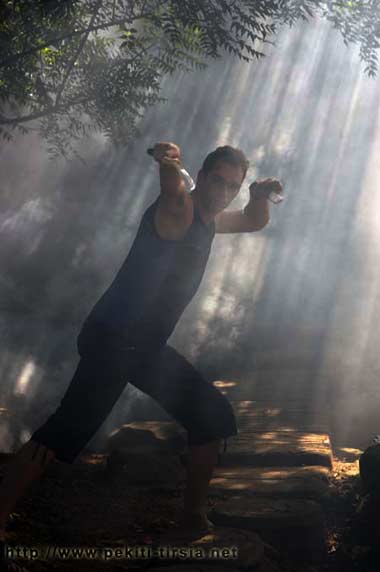 In March 2006 a European delegation travelled to the Philippines to visit friends and for a training camp in Filipino Martial Arts and Culture. The stay of the group and the training camp were organised by the Philippine Pekiti-Tirsia representatives on site and by Mandala Uli Weidle.
In March 2006 a European delegation travelled to the Philippines to visit friends and for a training camp in Filipino Martial Arts and Culture. The stay of the group and the training camp were organised by the Philippine Pekiti-Tirsia representatives on site and by Mandala Uli Weidle.
The purpose of the visit was to deepen the friendly relations that have been growing for many years between Pekiti-Tirsia practitioners in Europe and in the country of origin of Pekiti-Tirsia, the Philippines. Furthermore, the participants should have the opportunity to directly experience the virtues of the Filipino lifestyle and culture.
In addition to the above mentioned purposes this camp had another reason: In March 2006 it was exactly ten years since Grand Tuhon Gaje chose the two brothers Achim and Uli Weidle to teach Pekiti-Tirsia in Europe and to organise the spreading of the system in his name. This first decade anniversary of the mission to found Pekiti-Tirsia Europe should be celebrated in the Philippines together with our Filipino friends. In October 2006 the tenth anniversary of Pekiti-Tirsia Europe will be celebrated for the second time with a training camp in Germany - of course again with the presence of Grand Tuhon Gaje.
The Gathering in the Philippines
While some team members arrived a few days early to get used to the climate and get a first impression of the country, the majority of the group arrived the day before the training began. They arrived at Manila's Ninoy Aquino Airport on three different flights. With the assistance of the Philippine Customs, the European group members were welcomed by Pekiti-Tirsia representatives immediately after disembarking from the plane and then smoothly guided through the immigration formalities. The European group consisted of participants from Germany, Italy, the Netherlands, Spain, Great Britain, Finland and Sweden. While for most of the group it was their first time in the Philippines, some of the group had attended Pekiti-Tirsia training camps up to three times before. The group was being guided by Mandala Uli Weidle, who has a very good knowledge of the Philippines due to his more than 30 stays in the Philippines during the last ten years. Uli had travelled to the Philippines a few weeks before to make the final arrangements with his Filipino friends.
 After a brief welcome ceremony at the airport, the group set off for the next meeting point in Makati. The route was chosen so that the visitors could get their first impressions of the country during the short drive.
After a brief welcome ceremony at the airport, the group set off for the next meeting point in Makati. The route was chosen so that the visitors could get their first impressions of the country during the short drive.
After the short drive to Makati, everyone had a chance to relax and was offered food and complimentary drinks. Once everyone had gathered, Grand Tuhon Gaje, his nephew Mandala Rommel Tortal and the coaching team of the Manila Pitbulls and the Recon Marines officially welcomed the participants. After a short briefing and a meal at the Makati base, the whole group went to the first training area - the KUTT in Antipolo.
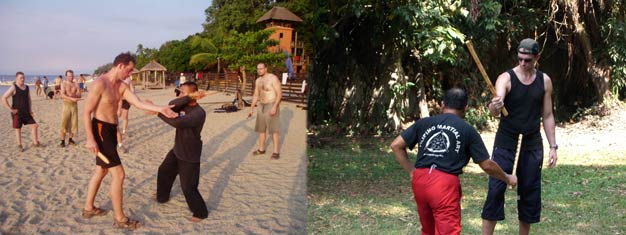
Training at the KUTT – “Kali Culture Under The Trees” in Antipolo:
Just a short trip from the hustle and bustle of Makatis, the KUTT area has a unique atmosphere that feels like you're in a different world. The century-old trees with thick trunks and long mangrove roots that have grown over decades create a magical atmosphere and provide cool shade and fresh air. The KUTT's location was spot on in terms of the climate. While the heat at the airport and in Makati was pretty intense for the visitors, especially after coming from the cold European winter, it was almost impossible to do a physically demanding training session. The elevated location of the KUTT offered a much more pleasant climate, with free sandy and grass areas – ideal for Kali and Dumog – tyre dummies for hitting exercises and open buildings for scenario training. In short, it was the perfect place for training.
Up until now, this area has only been used for private training sessions and was only open to friends of the family. Thanks to Uli Weidle's connections, the Pekiti-Tirsia group from Europe was the first international training group to be given the green light to train in this area. The KUTT is like a hidden Kali refuge, and that's exactly what it is. The area has its own martial arts history and a unique atmosphere, full of Filipino culture and pure Kali. Training at the KUTT is special, and even just being allowed to train there is worth the trip to the Philippines.
Grand Tuhon at his best
 Grand Tuhon Gaje clearly enjoyed the great atmosphere during the whole training camp. Even Filipinos who took part were amazed at how generously Grand Tuhon shared not only the most advanced fighting methods of Pekiti-Tirsia, but also explained the functional correlations in a detailed and logical way with practical examples. The material that was offered during the camp was definitely worthy of a 10-year anniversary.
Grand Tuhon Gaje clearly enjoyed the great atmosphere during the whole training camp. Even Filipinos who took part were amazed at how generously Grand Tuhon shared not only the most advanced fighting methods of Pekiti-Tirsia, but also explained the functional correlations in a detailed and logical way with practical examples. The material that was offered during the camp was definitely worthy of a 10-year anniversary.
Grand Tuhon was backed by three Recon Marines who've been training Pekiti-Tirsia for ten years in the Marine Corps. They know a thing or two about close-quarters combat. The Marines were in charge of the daily strength, conditioning and mobility training. Grand Tuhon Gaje taught the technical intricacies of the art with the support of Mandala Rommel Tortal. Many of the Europeans already knew Rommel from Uli's descriptions. After experiencing him first-hand, they realised that Uli hadn't been exaggerating.
Training “From Dawn Till Dusk”
 At 5 a.m., the recon marines got our training started with a jog. Next, we did power and speed exercises on the tyre, which got us all ready for the day ahead. The Recon Marines led this part of the training, setting the pace for the group and pushing everyone to their personal limits. This kind of training is similar to the Warrior Camps that Uli Weidle offers in Europe. Everyone trained hard and supported each other, which fostered a sense of cooperation and friendship. By the end, everyone was exhausted but happy.
At 5 a.m., the recon marines got our training started with a jog. Next, we did power and speed exercises on the tyre, which got us all ready for the day ahead. The Recon Marines led this part of the training, setting the pace for the group and pushing everyone to their personal limits. This kind of training is similar to the Warrior Camps that Uli Weidle offers in Europe. Everyone trained hard and supported each other, which fostered a sense of cooperation and friendship. By the end, everyone was exhausted but happy.
As the temperature rose around lunchtime, the training got more technical, with Grand Tuhon and Mandala Rommel teaching the group the ins and outs of technical fighting. The training was more technical, but just as intense as the marines' training. The Dumog-counter training was especially intense. Pangamut and Dumog (Filipino empty hand fighting and combat wrestling) were an important part of daily training. Of course, not only empty hand fighting, but also stick, sword and Pekiti-Tirsia knife training were part of daily training.
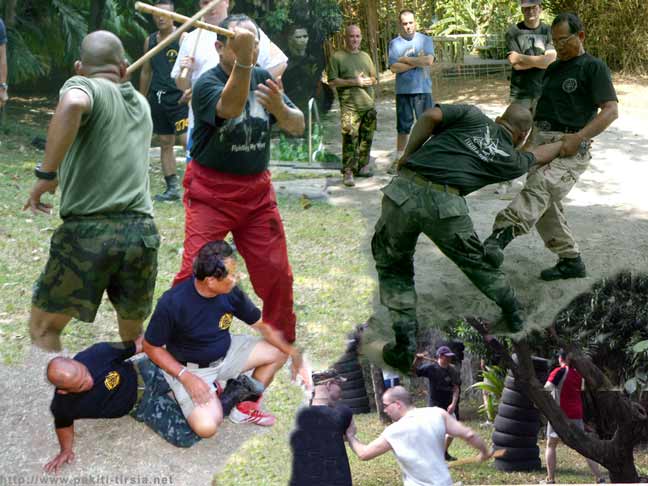

Food Paradise Philippines
The camp members were pushed hard with intense training and an unfamiliar climate, but the training intensity was just right and good food and Hilot made sure that nobody would run out of steam. Grand Tuhon and the trainers found a good rhythm for the camp.
With a kitchen and a whole staff taking care of the group's needs, there was no need to worry about staying hungry or not being able to train because of heavy food. Every two hours, there were fresh Filipino delicacies on offer between the training units throughout the day.
After the early morning power and endurance training, there was a light breakfast. This mainly consisted of freshly prepared taho, which is a delicious, warm drink made of soybean-quark with perltapioka/maniok starch. It was sweetened on demand with brown syrup, as well as fruit, tea and coffee. This was a great way to start the day, giving you a quick refreshment and the energy to train on with full energy right after breakfast.
During the training days, there was a steady supply of refreshing drinks, like fresh mango, buko, or kalamansi juice, as well as local delicacies like adobo, karekare, kinilaw, lumpia, lechera flan, longanisa, penoy, and more. There was also pinakbet bagoong, kwek-kwek, sinigang na miso, suman, pansit, mango bagoong, rice, and an endless supply of freshly picked and cooled buko (coconut) and a huge variety of fruits.
Once they'd tried the food, especially the fresh fruit, everyone understood what Grand Tuhon meant when he said, "Come to the Philippines – come to where the flavour is!"

Special cultural Programme
Some of the group members brought their partners, who weren't interested in training. To keep them engaged, the Bataclan family offered a unique cultural programme, including shopping, visits to churches, and introductions to Filipino cooking. They gained valuable experiences and insights that can't be found in a book or ordered through a travel agency.
Regenerating with Hilot
Another great thing about the KUTT training was that it included permanent hilot care for all the camp participants. Every day, Hilot therapists recommended by the ATHAG (Association of Traditional Health and Aid Givers) were on hand to treat any injuries that might occur. To help prevent injuries, we offered a daily Hilot massage to all participants as part of the training programme. These massages helped relax tight muscles, improve inner balance and regenerate used energy. Thanks to the healthy food and Hilot care, the physically and mentally challenging training programme could be completed without any injuries or visible signs of fatigue. In fact, the tiring strains of the challenging training were hardly noticed, and the camp participants were full of positive energy all the time.
Enchanted Moments – Training with Music
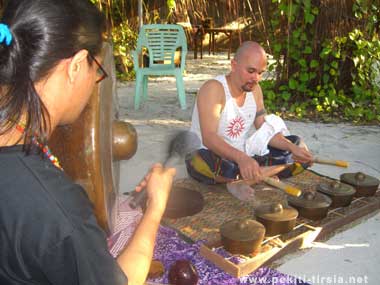 In recent years, there's been a bit of a resurgence in Filipino art, with artists rediscovering the arts and values of the country's pre-Hispanic culture. This has led to some fruitful collaborations between martial arts and performing arts, including theatre, dance and music. It's a win-win situation: everyone benefits from an atmosphere of free exchange and the discovery of similarities in their traditional values.
In recent years, there's been a bit of a resurgence in Filipino art, with artists rediscovering the arts and values of the country's pre-Hispanic culture. This has led to some fruitful collaborations between martial arts and performing arts, including theatre, dance and music. It's a win-win situation: everyone benefits from an atmosphere of free exchange and the discovery of similarities in their traditional values.
Pekiti-Tirsia Europe has a close relationship with some of those artists. As a result of this connection, there was also a music group at the camp, providing support for our training with traditional Filipino music. Everyone was welcome to try playing the traditional instruments with the help of the musicians, and we also had an introduction to their origins and meaning. When the musicians started jamming with the training sessions, Filipinos and Europeans were all taken by the flow: the KUTT, the music and everybody who trained became one, and it was one of those enchanted moments that words alone cannot describe.
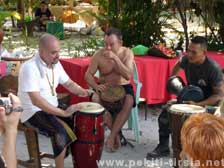 Later in the curriculum of the camp, the participants visited a Filipino folklore group who showed different Filipino dances of the time before and during the Spanish colonial era. All, who wanted to, could test themselves as dancers. Several participants took the friendly challenge as an opportunity and proved, that the fast legs and the feeling for body and rhythm – gained through Kali practise – are also very good preparation for Filipino dancing.
Later in the curriculum of the camp, the participants visited a Filipino folklore group who showed different Filipino dances of the time before and during the Spanish colonial era. All, who wanted to, could test themselves as dancers. Several participants took the friendly challenge as an opportunity and proved, that the fast legs and the feeling for body and rhythm – gained through Kali practise – are also very good preparation for Filipino dancing.
Tagaytay, Balisong and Batangas:
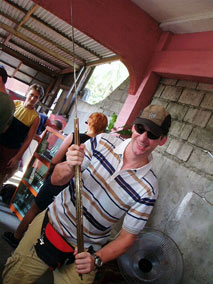 After some days of training in Antipolo the second part of the camp took place on the beach at San Juan, Batangas. During the transfer the training team had opportunity to taste more local delicacies like the delicious Buko cake and they also had short visits to some regional sights, like for example the famous Taal volcano.
After some days of training in Antipolo the second part of the camp took place on the beach at San Juan, Batangas. During the transfer the training team had opportunity to taste more local delicacies like the delicious Buko cake and they also had short visits to some regional sights, like for example the famous Taal volcano.
The group also stopped at Batangas, visiting the smithy of the famous Batangas knives (also known as Balisong or Filipino butterfly-knife). And everybody who wanted to could of course buy knives, swords and other “warrior necessities” – a small glimpse of paradise for every martial artist.
Training in San Juan
In San Juan the group stayed at a beach resort which is the private property of a well known Filipino artist. Tastefully furnished with wonderful Filipino flair, situated directly at the beach with white sand and shady palms, the resort provided everything a Kali training group needs. The resort was an inside tip by one of our Filipino friends: Because the Pekiti-Tirsia group was using the resort exclusively, the resorts resources could be used as needed for the training group and the meals presented in type of a rich buffet were perfectly coordinated with our training timetable.
Training at the Beach and in the Sea
Shady trees and a large, free, sandy beach invited to a morning workout. Especially jogs on the sand were an unusual exhausting experience. But being well prepared by the former training days in Antipolo and inspired by the Marines and Uli Weidle, who jogged leading the group, everybody could reach their inner energy reserves and despite of the extremely demanding ground almost all of the group were able to complete the track on the last day. Even the Marines respected the European team members for their willpower and physical fitness.
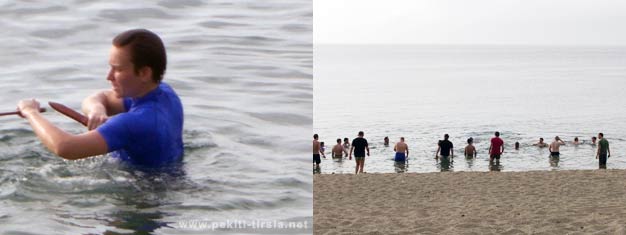
After the strenuous morning workout Grand Tuhon Gaje and Mandala Rommel Tortal took over with their training units. Each of them took one half of the group and changed parts later. Again the main topics were Dumog and knife. Training took place on the beach and with increasing temperature beneath the palms in the shady spaces as well as in the sea itself.
Near to the resort there was a sea-life conservation which invited for snorkelling and diving after training. The water was clear and full of fishes. Even turtles could be seen.
A Kali Family
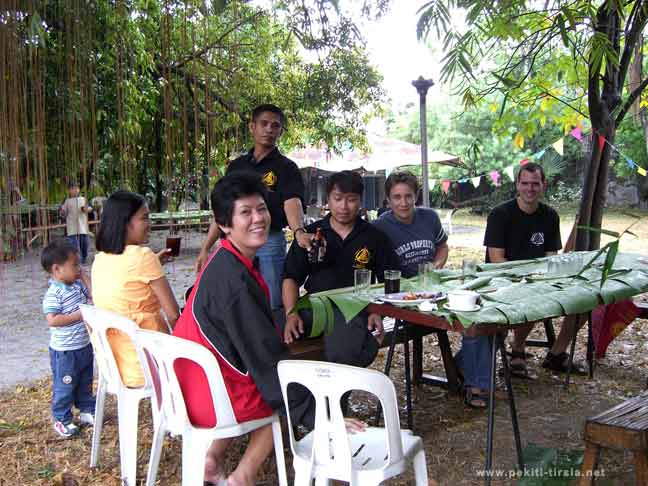
Since the training camp was arranged to be during Filipino school holidays, Grand Tuhon’s wife and their son Leo "Jamjam" Gaje III. had the opportunity of visiting us in Batangas. For the European group it was a pleasure to share the wonderful time in San Juan with Grand Tuhon’s family and the friends from Philippines.
While training in San Juan in addition to the Manila Pekiti-Tirsia Pitbulls and the most experienced Recon Marines, who had joined us, also some members of a counter terrorism police commando joined in. This gave possibility for more interesting discussions while enjoying the bonfire after training. Camp participants with a background as police or military were invited for a training at the Philippine National Police (PNP) Headquarters experiencing the Pekiti-Tirsia Gunology with life weapons taught to PNP by Mandala Rommel Tortal. They were also invited to test their skills at the shooting range.
Manghihilot at the Camp
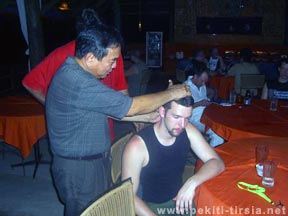 In spite of his hectic schedule and a very important business invitation from the Shangri-La hotel group, the foremost Hilot expert of the ATHAG, Boy Fajardo, did not allow this to let him be stopped and he took on a journey of several hours to personally visit our camp meeting and greeting his Filipino and European friends. During his stay he demonstrated and lectured about theory and practices of Hilot. In the Philippines “Tito” Boy Fajardo is a highly respected Hilot expert who is not only from a family of famous healers, but he also made it his life's mission to explain and teach Hilot so that it is not only understood as an art of experienced healers intuition but also as a systematic science. Tito Boy already was invited by many universities outside of the Philippines to lecture and demonstrate about Hilot. He is also authorized by ATHAG and the Filipino government to further systematise Hilot and to distinguish authentic Hilot from fake.
In spite of his hectic schedule and a very important business invitation from the Shangri-La hotel group, the foremost Hilot expert of the ATHAG, Boy Fajardo, did not allow this to let him be stopped and he took on a journey of several hours to personally visit our camp meeting and greeting his Filipino and European friends. During his stay he demonstrated and lectured about theory and practices of Hilot. In the Philippines “Tito” Boy Fajardo is a highly respected Hilot expert who is not only from a family of famous healers, but he also made it his life's mission to explain and teach Hilot so that it is not only understood as an art of experienced healers intuition but also as a systematic science. Tito Boy already was invited by many universities outside of the Philippines to lecture and demonstrate about Hilot. He is also authorized by ATHAG and the Filipino government to further systematise Hilot and to distinguish authentic Hilot from fake.
Tito Boy’s friendly physical presence and smile lets everybody notice right away his inner peace and contentedness. He is living example of the fact that good health is an inner state of balance and of “being consistent with the universal laws of nature” as Tito Boy says. “You cannot give what you do not own yourself”, he says when he describes how a Hilot education works. He definitely owns it.
He defines Hilot as follows: «The principles of Hilot have been practised for more than a thousand years and date back to an era that pre-dates Philippines written history. It is a highly intuitive treatment therapy wherein the Hilot therapist identifies areas of energy imbalance through touch diagnosis, and then customises the treatment to alleviate or remove the imbalances.»
About the basic concept of Hilot he says: «Thebasic concept of Filipino Traditional Healing is that health andwellness are the results of balance and harmony, and that discomfortand illness are the results of imbalance and disharmony. As such, thegoal of Hilot treatments is to restore balance and harmony in allbodily functions, and in their interactions, thereby restoring thenormal, natural functioning of the body.»
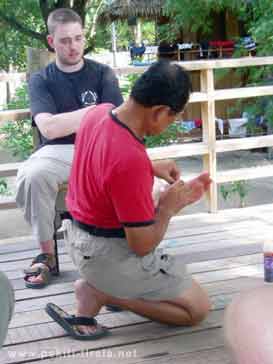 Hilot and Pekiti-Tirsia share a lot of philosophical ideas. It may be astonishing but not really surprising, because both originate from the tradition of the same old Filipino culture. In fact Grand Tuhon Gaje as well as his wife are well known for their healing knowledge and Tito Boy mentioned to the group about his grandfather, a respected Healer, who was a champion of Filipino martial arts in his region. Tito Boy is not a martial artist. He feels that he owes Hilot his health and vitality, since in his younger years he had overcome a severe disease with the help of Hilot. Now he totally dedicates himself to the art of healing.
Hilot and Pekiti-Tirsia share a lot of philosophical ideas. It may be astonishing but not really surprising, because both originate from the tradition of the same old Filipino culture. In fact Grand Tuhon Gaje as well as his wife are well known for their healing knowledge and Tito Boy mentioned to the group about his grandfather, a respected Healer, who was a champion of Filipino martial arts in his region. Tito Boy is not a martial artist. He feels that he owes Hilot his health and vitality, since in his younger years he had overcome a severe disease with the help of Hilot. Now he totally dedicates himself to the art of healing.
During the time Tito Boy stayed at the camp he offered personal treatments to those who wanted to benefit from his healing skills. It was very interesting to observe the Hilot methods of Tito Boy, Grand Tuhon and his wife, since all of them have profound knowledge in western medicine as well as in Filipino herbal and healing arts. It was a pity that Tito Boy because of his busy schedule was only able to stay for one day. All the participants were impressed by his friendly character and his knowledge of the healing arts. Mandala Uli said that he would further maintain the already existing good contact with Tito Boy and with Tito Boy’s and Grand Tuhon’s support he would continue to explore and promote Hilot.
Mission accomplished
The set goal of Mandala Uli and his Filipino friends for this training camp was to provide the camp participants with personal experience of the variety of Filipino life conditions (big city, country life, mountain and beach life) as well as the filipino peoples mentality and lifestyle, which is the key to unlock the understanding of the strengths of Pinoy culture and of pinoy martial arts. Evaluating the camps results it can safely be said, that the set goal has been accomplished far better as imagined. The camp provided a very special experience, that cannot be gained living in hotels or hanging out in the usual tourist spots. It provided a unique lifestyle and family type bonding experience which can only be given from friends to friends. In the training course of the camp Grand Tuhon and Mandala Rommel showed martial arts at its finest, which by itself would have been reason enough to travel around the world, yet similar in importance was that the members of the visiting group was able to experience the hospitality of a pinoy martial arts family that adheres to the traditional values and how that specific life circumstances and lifestyle expresses itself as a distinct quality in martial arts. A human quality, that is brought by Uli Weidle to Europe and it is typical for the European Pekiti-Tirsia community and it is immediately recognised by new beginners who attend training events from the Pekiti-Tirsia Europe.
This training camp benefited from Mandala Uli's ten years intensive experience in Philippines and it was only possible because of the friendship of the family Bataclan and of course because the unconditional support from Grand Tuhon Gaje and his family. It was an all in all successful event, that provided a good oversight over the variety of Filipino Martial Art and culture and at which new friendships were established and old friendships were strengthened.Indeed the camps participants common feedback about the camp was: “The camps goal was not only reached – it was SURPASSED!”■
Personal Word from Uli Weidle
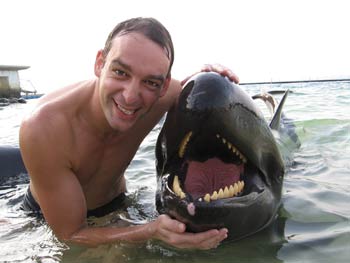 In the time I have spent in the Philippines during the last ten years I have experienced quite some Pekiti-Tirsia history in the making. The announcement of Grand Tuhon’s son, Leo III., as his future successor, the 100-year-anniversary of Pekiti-Tirsia and the 100-year-anniversary of the Republic of the Philippines as well as the Battle of Grandmasters are only some of the outstanding events that come to my mind spontaneously. All of these experiences had something unique and I don’t want to miss the memory of any of them. I have been to many training camps in many regions of the Philippines. Among all of these many events, the last one is really special. I never experienced before the Pinoy culture so pure, densely packed and intense while being in a group of Americans or Europeans. Yet the food alone offered culinary highlights that are rarely found by the common tourist. The time spent together with friends from Philippines and Europe had so many cherished moments, that I’m still deeply touched while writing these lines today. My special thanks go to Kuya Jay, to his parents and his family who made all of this possible by their cordiality and their absolute hospitality. They also go to Grand Tuhon’s wife Tita Gigi, a real friend who is always there to support in word and deed. Of course my gratitude goes to my dear friends Mandala Rommel Tortal as well as to Guro Jasper and his family and to 'Silent Agent' Micky and all Manila Pitbulls who supported and enriched our camp with their presence. The Recon Marines who motivated and inspired us with their example and my very special friend, champion Daniel “The Mumbakki” Foronda, I do not want to let him unmentioned. Many thanks also to all of the camp participants who have represented our Europe so outstandingly in the Philippines. I will always cherish this camp in the Philippines as something very special. For this and everything else I’d like to deeply thank Grand Tuhon Gaje, the man who made all of this possible.
In the time I have spent in the Philippines during the last ten years I have experienced quite some Pekiti-Tirsia history in the making. The announcement of Grand Tuhon’s son, Leo III., as his future successor, the 100-year-anniversary of Pekiti-Tirsia and the 100-year-anniversary of the Republic of the Philippines as well as the Battle of Grandmasters are only some of the outstanding events that come to my mind spontaneously. All of these experiences had something unique and I don’t want to miss the memory of any of them. I have been to many training camps in many regions of the Philippines. Among all of these many events, the last one is really special. I never experienced before the Pinoy culture so pure, densely packed and intense while being in a group of Americans or Europeans. Yet the food alone offered culinary highlights that are rarely found by the common tourist. The time spent together with friends from Philippines and Europe had so many cherished moments, that I’m still deeply touched while writing these lines today. My special thanks go to Kuya Jay, to his parents and his family who made all of this possible by their cordiality and their absolute hospitality. They also go to Grand Tuhon’s wife Tita Gigi, a real friend who is always there to support in word and deed. Of course my gratitude goes to my dear friends Mandala Rommel Tortal as well as to Guro Jasper and his family and to 'Silent Agent' Micky and all Manila Pitbulls who supported and enriched our camp with their presence. The Recon Marines who motivated and inspired us with their example and my very special friend, champion Daniel “The Mumbakki” Foronda, I do not want to let him unmentioned. Many thanks also to all of the camp participants who have represented our Europe so outstandingly in the Philippines. I will always cherish this camp in the Philippines as something very special. For this and everything else I’d like to deeply thank Grand Tuhon Gaje, the man who made all of this possible.
Uli Weidle,
Reutlingen, Juni 2006
Media:
Impressions from the camp: Video 7 minutes
Further readings:
→ travel report 2004 (BBC, Special Action Force, christmas, new year celebration, Otso-Otso,...)
→ travel report 2009 Europe Philippines Friendship Training
→ more Travels and Events in our Action-Book
→ calendar for future seminars and events